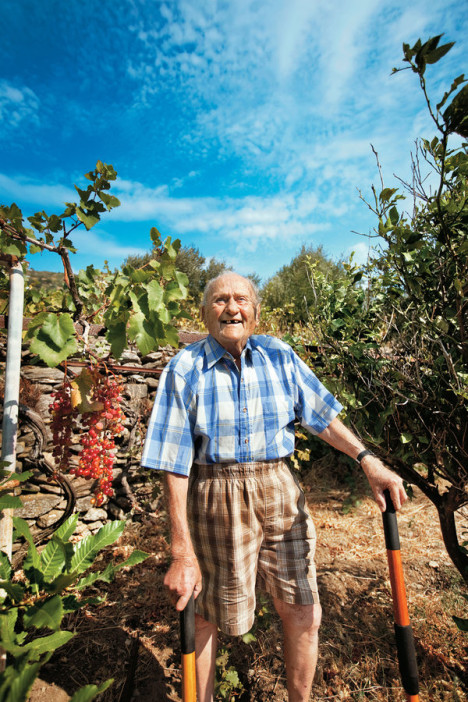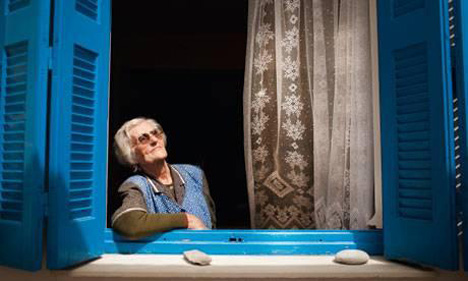I’ve written about my visit to Ikaria a few times, through a little series that’s evolved on my blog titled “How to live to 100”. Paniyiris and wine, eating no sugar and eating pork are some of the tricks I came across.

Recently my mate Dan Buettner, a National Geographic adventurer and author of the New York Times bestseller The Blue Zones has been out and about spreading the word on the place, based on our trip there together last year. It’s been interesting to see what other journalists (who’ve since travelled to the island to see things for themselves) have found. Here a bit of a list drawn from Guardian and New York Times articles, from the mouths of the oldies themselves.
Drink wine and walk.
Gregoris Tsahas, 100: Drinks two glasses of red wine a day. And walks four hilly kilometres a day from his house to his local cafe and back.
Rest when you need to and sleep with the window open.
Kostas Sponsas, 100: “If I feel tired, I read. It rests my mind.” He never eats fried food. Always sleeps well and with the window open. Drinks herbal teas and red wine with his food.
Stamatis Moraitis, 102: Wakes up when he feels like it, works the vineyards til mid afternoon, has lunch and takes a nap. In the evenings he walks to the local tavern and plays dominoes well past midnight.
Don’t watch the time.
Dr. Ilias Leriadis, one of Ikaria’s few physicians: “People stay up late here. We wake up late and always take naps. I don’t even open my office until 11 a.m. because no one comes before then. Have you noticed that no one wears a watch here? No clock is working correctly. When you invite someone to lunch, they might come at 10 a.m. or 6 p.m. We simply don’t care about the clock here.”
Be with family.

Evangelia Karnava, 97: “To have your family around you makes you feel stronger and more secure.” She speaks of her three children, seven grandchildren, four great-grandchildren and her great-great-grandchild.
Eleni Mazari: “We keep the old people with us. There is an old people’s home, but the only people there are those who have lost all their family. It would shame us to put an old person in a home. That’s the reason for longevity.”
Ilias Leriadis: It’s not a ‘me’ place. It’s an ‘us’ place.”
Work in the garden.
Thanasis and Eirini Karimalis, married for more than 75 years: Wake naturally, work in the garden, have a late lunch, take a nap. At sunset they get together with their neighbours.
Nikos Fountoulis, 93: He still has a smallholding in the hills of the island’s interior. Each morning he goes out at 8am to feed his animals and tend his garden.
Vangelis Koutis, 97: “Fresh air, the best climate in the world and the friendliest people I’ve ever met.”
And eat honestly.
As Dan writes: Every one of the Ikarians’ dietary tendencies had been linked to increased life spans: olive oil — especially unheated — reduced bad cholesterol and raised good cholesterol. Goat’s milk contained serotonin-boosting tryptophan and was easily digestible for older people. Some wild greens had 10 times as many antioxidants as red wine. Wine — in moderation — had been shown to be good for you if consumed as part of a Mediterranean diet, because it prompts the body to absorb more flavonoids, a type of antioxidant. And coffee, once said to stunt growth, was now associated with lower rates of diabetes, heart disease and, for some, Parkinson’s. Local sourdough bread might actually reduce a meal’s glycemic load. You could even argue that potatoes contributed heart-healthy potassium, vitamin B6 and fiber to the Ikarian diet. Another health factor at work might be the unprocessed nature of the food they consume: because islanders eat greens from their gardens and fields, they consume fewer pesticides and more nutrients. It’s been estimated that the Ikarian diet, compared with the standard American diet, might yield up to four additional years of life expectancy.
And Gary Taubes, founder of the nonprofit Nutrition Science Initiative and the author of Why We Get Fat comments: “One explanation why they live so long is they eat a plant-based diet. Or it could be the absence of sugar and white flour.” One survey of the diet of 673 Ikarians found they consumed about six times as many beans a day as Americans, ate fish twice a week and meat five times a month, drank on average two to three cups of coffee a day, consumed high levels of olive oil along with two to four glasses of wine a day and took in about a quarter as much refined sugar.
Dr. Ilias Leriadis, one of Ikaria’s few physicians: the locals drink “mountain tea,” made from dried herbs endemic to the island, which is enjoyed as an end-of-the-day cocktail. Wild marjoram, sage (flaskomilia), a type of mint tea (fliskouni), rosemary and a drink made from boiling dandelion leaves and adding a little lemon. “People here think they’re drinking a comforting beverage, but they all double as medicine,” Leriadis said. Honey, too, is treated as a panacea. “They have types of honey here you won’t see anyplace else in the world,” he said. “They use it for everything from treating wounds to curing hangovers, or for treating influenza. Old people here will start their day with a spoonful of honey. They take it like medicine.”
Hoping to live to 100? Do you employ any of these tips in your life already?

